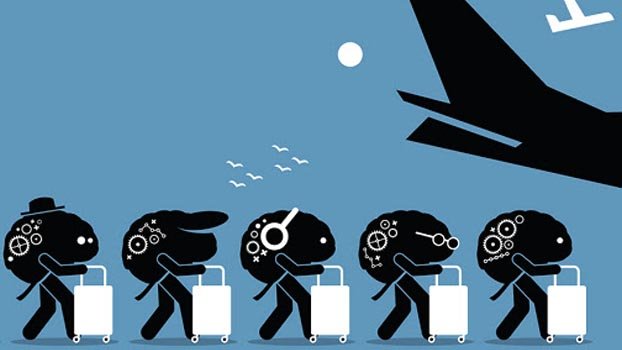Brain drain and knowledge gain

Brain drain is the migration of highly-trained or qualified personnel in search of the better standard of living and quality of life, higher salaries, access to advanced technology and many more. Bangladesh faces a shortage of trained manpower, especially in critical areas like healthcare and engineering and higher education. Every year, a large number of trained personnel emigrate for higher education and jobs. Experts are of the opinion that developed countries like Australia, Canada, USA and UK are taking away our meritorious students, offering them opportunities for higher education with attractive job packages.
Surely, such a crisis indicates the need for transforming Bangladesh into a country where young, creative people will want to stay and try to make something of their lives. Even if local salaries are much lower, local costs are also somewhat lower too; many professionals might choose to stay in their homeland if some basic conditions are improved.
Hence, it is encouraging to note that the incumbent government is giving highest priority to preventing brain-drain by inviting talented graduates to join public services and contribute in the ongoing mega development programmes of the country. To achieve the goals the government has taken many initiatives, including substantially raising salaries, offering low interest bank loans, drastically improving housing for officers and other lucrative facilities to encourage talented graduates to apply for jobs at home.
As a democratic country Bangladesh cannot forbid its citizens to leave. It can, however, put in place systems that would make it possible for the country to benefit from the investment made in the young through subsidised education, particularly technical and medical.
In this regard, adopting Australia’s deferred tuition plan would be pertinent. Under this system, all tertiary education is subsidised by the government, with students paying only a portion of the cost as fees. Graduates who go on to work in sectors deemed as priority by the government are not required to pay any additional amounts, but those who migrate or move to non-priority sector have to pay the subsidised amount over a set number of years.
This ensures that higher education remains affordable and that government’s education subsidy is not misused. For developing countries like Bangladesh, the loss of human capital is a serious issue. Those who go abroad to pursue higher education, should be motivated to come back and serve their own country. Implementing more creative policy can be the way to stem the migration of trained manpower.
For developing countries, the positive aspects of migration and brain drain include improved quality of life through better employment opportunities which also allows migrants to remit part of their earnings to their countries of origin. Additionally, they are able to further develop their skills, therefore improving their expertise and, where applicable, their children gain access to better education opportunities. The first of many negative aspects is that families become separated in this process and also developing countries lose skilled labor which is essential for their development and, as a result of the working-age population moving away, the size of the workforce in developing countries is reduced. When it comes to developed countries, this phenomenon helps to reduce gaps in the labor market as potential employees tend to offer more flexibility, and the populations in the host country gain the opportunity to learn about other cultures and religions. However, in terms of the negative impacts, people associated with migration and brain drain are sometimes affected by racism, discrimination and a lack of opportunities. The result of this is an increased demand for social and housing benefits which may create some challenges for the host communities
Recent research shows that brain drain is not necessarily a loss for the sending country. Brain drain can contribute to the development of the home countries through brain circulation and linkage. Even if the highly-skilled professionals from the developing countries decide not to return from the host countries, they can still contribute to the social and economic development of their home countries. To optimise the benefit, a clear understanding of the high-skilled labour flows involving brain retention, brain gain, brain circulation and brain linkages is needed.
In order to stop brain drain, our universities have to play a crucial role. But too often our universities act as mirrors rather than solar panels – taking in the best and the brightest and then bouncing them out again rather than retaining them to add energy and value to the local economy. At a time of debate over whether higher education delivers value, universities must work harder to demonstrate the positive impact they have on their local area.
Universities need to invest more in connecting their students with local businesses, so that students learn more about the opportunities for future employment close to where they have chosen to study. Employability remains a key priority, with our surveys consistently showing that students want their institutions to do more to give them experience of and access to the workplace. By forging broader and deeper links with local employers, universities can kill two birds with one stone – boosting their offer to young people and simultaneously improving their contribution to their local economy by making it more likely that students will stay on after graduation.
There is no denying our country has given wings to our students integrating prudent policies paving the ways for migration. Without knowing and exploring the world, we cannot determine our position and find out our limitations. We expect our students to leave the nest to acquire further knowledge from the best ideas and practices out there. At the same time, we must fix our nests in a way that attracts to come back and serve their homeland.
The writer is Editorial Assistant, Bangladesh Post



